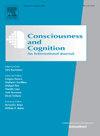实验证据表明,预测的虚幻感觉可以由熟悉度检测引起
IF 2.1
3区 心理学
Q2 PSYCHOLOGY, EXPERIMENTAL
引用次数: 0
摘要
d录影带是一种感觉,对某种情况感到熟悉,但认为以前从未遇到过这种情况。d郁闷的一个有趣方面是,它经常与一种知道接下来会发生什么的虚幻感觉(预测感,简称FOPs)联系在一起。研究表明,与没有FOP的dcv相比,有FOP的dcv携带着更高的感知熟悉度。然而,这些发现主要是相关的,因此尚不清楚熟悉感本身是否在FOPs中起因果作用。在三个实验中,我们检验了在实验中增加熟悉度是否会导致FOPs。在先前用于研究dsamujovu的方法的一种变体中,参与者完成了对新场景的虚拟旅行,每个场景的空间布局都有不同程度的熟悉(一个布局相似的场景之前被展示了三次,一次,或者根本没有)。参与者被问及对新场景是否感到熟悉,是否知道接下来会发生什么,并预测会发生什么。参与者从未被问及对d本文章由计算机程序翻译,如有差异,请以英文原文为准。
Experimental evidence that illusory feelings of prediction can be caused by familiarity detection
Déjà vu is the sensation that a situation feels familiar while believing that it has never been encountered before. An interesting facet of déjà vu is that it is often associated with an illusory sense of knowing what will happen next (feelings of prediction, or FOPs). Research has shown that déjà vu accompanied by FOPs carries with it higher perceived familiarity intensity than déjà vu unaccompanied by a FOP. However, these findings have mainly been correlational, making it unclear if the sense of familiarity itself plays a causal role in FOPs. In three experiments, we examined whether experimentally increasing familiarity can causally drive FOPs. In a variant of a method previously used to study déjà vu, participants completed virtual tours of novel scenes that each had their spatial layout familiarized to a different degree (a scene with a similar layout was earlier presented three times, once, or not at all). Participants were asked if the novel scene felt familiar, if they had a sense of what would happen next, and to predict what would happen. Participants were never asked about feelings of déjà vu to eliminate the possibility that prompting the déjà vu experience could lead participants to think they should respond a certain way to the other questions. When participants could not actually recall the similar studied scene, FOPs increased with increases in experimentally created spatial layout familiarity. These results suggest that familiarity-detection itself can produce FOPs during déjà vu, and potentially outside of déjà vu as well.
求助全文
通过发布文献求助,成功后即可免费获取论文全文。
去求助
来源期刊

Consciousness and Cognition
PSYCHOLOGY, EXPERIMENTAL-
CiteScore
4.30
自引率
8.30%
发文量
123
期刊介绍:
Consciousness and Cognition: An International Journal provides a forum for a natural-science approach to the issues of consciousness, voluntary control, and self. The journal features empirical research (in the form of regular articles and short reports) and theoretical articles. Integrative theoretical and critical literature reviews, and tutorial reviews are also published. The journal aims to be both scientifically rigorous and open to novel contributions.
 求助内容:
求助内容: 应助结果提醒方式:
应助结果提醒方式:


